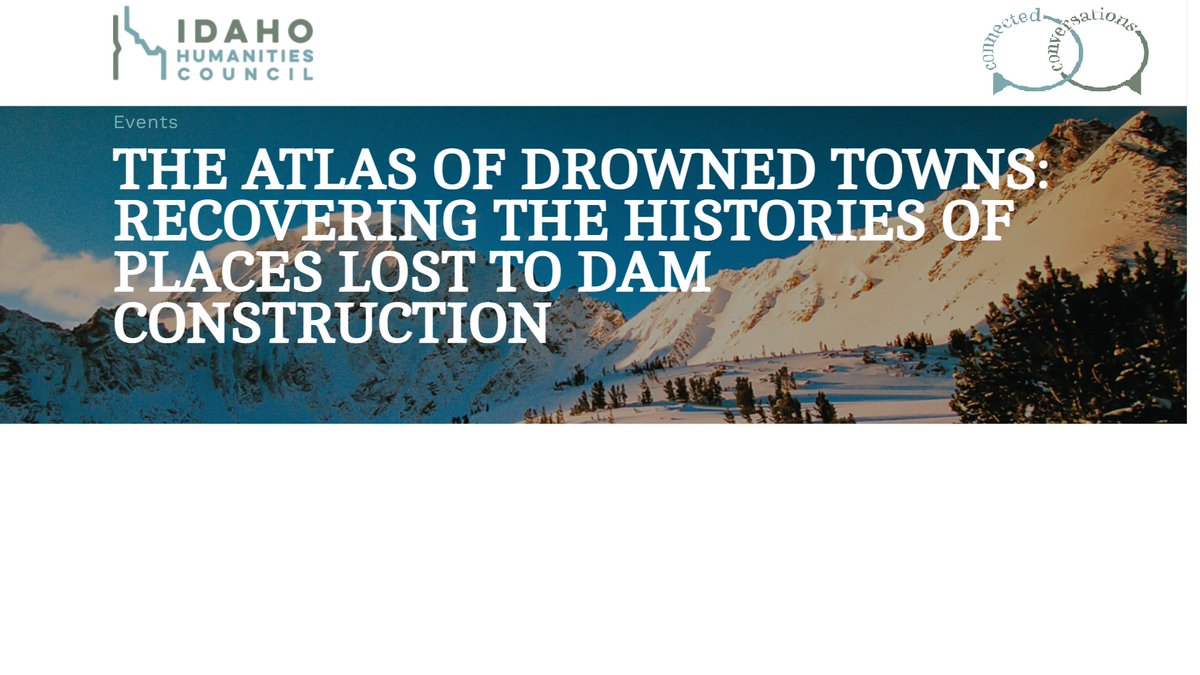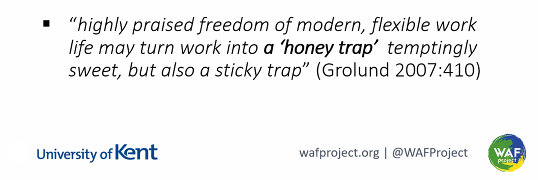
Looking forward to hearing more about the "The Atlas of Drowned Towns" project, which seeks to rediscover the #history of towns across 🇺🇸 that were lost in 20th century due to dam construction #DrownedTowns 

First, @BSUHistory's Bob Reinhardt gives an overview of his interest in the subject, starting with his Master's research - in particular exploring how "drowned towns" were chosen, what was it like when the towns disappeared & how did residents feel about it? #DrownedTowns
Reinhardt says that a lot of public awareness exists around the construction of large dams - especially from the 1950s/60s "boom years". These because sources of civic pride and tourist attractions in their own right #DrownedTowns
However, Reinhardt says that comparatively little is known about the towns that they displaced. Says this is quite remarkable when you consider there are over 100 dams on the snake river alone. 40 of which are larger than 640 acres (average size of a township) #DrownedTowns 

While there is some interest in the subject of the towns, and the stories of the people within them, Reinhardt says that there is still much more unknown information about these towns and the people that lived in them #DrownedTowns 

Looking at how residents responded to displacement, Reinhardt expresses surprise that the news was met not with protest, but with "muted disquiet" & "measured support". Largely complained about lack of notice, but generally felt jobs & growth were "worth it" #DrownedTowns
Reinhardt says this was part of a "Cold-War Consensus" that anything that caused the economy to grow was a good thing, along with anxieties around national security needing 🇺🇸 to be more self-sufficient #DrownedTowns
Turning to the "The Atlas Of Drowned Towns" project, Reinhard describes the mission of the project as being "to explore the histories of the dozens of communities in the American West inundated by dam construction in the twentieth century" #DrownedTowns
In particular, Reinhard wants to focus on the concept of "place" - what individual buildings, facilities, communities & people were displaced - making it more of a social community history, not just an academic exercise #DrownedTowns
Reindhardt also hopes to work with local history societies, tribal government, federal agencies, private companies, displaced people & their descendants, as well as wider academic historians and researchers #DrownedTowns
The project is already making some preliminary findings. Reinhardt looks at the example of Robinette Oregon, which was a town built in 1908, originally settled in the 1880s and grew due to the construction of a railway depot #DrownedTowns
However, in the 1920s/30s, a series of fires & burglaries led to a reduction in the population & the removal of the railway depot. This led to just having a population of 69 people in the 1930s #DrownedTowns
By the 1940s, the Brownlee Dam site was given approval which was the "death knell" for Robinette. The post office closed, the final people moved out of the town and construction of the Brownlee Dam began, completed in 1959 #DrownedTowns
However, Reinhardt says this is not the end of the story. Notes that new data from the 1950s will soon become publicly available which will enable us to have a better understanding of how people responded to the loss of Robinette & where they moved to #DrownedTowns
Turning to the process of how to discover more information, Reinhardt says that local museums & libraries are often an "untapped goldmine" of underused materials for research #DrownedTowns
Reinhardt reads from from an interview from a local history archive on the construction of a dam: "I hated it! It done away with my native homeland that I loved as much as anything I ever did love. I hated to leave it." #DrownedTowns 

Reinhardt also recommends visiting locations during the "low seasons" of the reservoirs. Many still contain the remnants of old buildings & infrastructure, creating "ghost towns" of the past #DrownedTowns
Finally, Reinhard also calls on people to visit the "The Atlas Of Drowned Towns" website and submit and share their own stories online #DrownedTowns
The webinar moves on to a Q&A #DrownedTowns
First Q is on how towns were selected for removal. Reinhard said it was partially down to "bad luck" of geography, but also companies tended to target marginalised & declining communities, which made it easier to "make a case" for removing "failing townships" #DrownedTowns
However, Reinhardt says that, while this was an "easier sell" than having to demolish thriving towns or large cities, it failed to take into account the sense of community within those locations #DrownedTowns
When asked who the main beneficiaries were, Reinhardt says the benefits of dams was provision of cheap hydropower. Was sold as benefiting thriving urban areas as "cheap power will lead to new homes & better jobs", rather than improving the lot of existing residents #DrownedTowns
On how communities in neighbouring towns have adapted to the changing rivers due to the dam construction, Reinhardt says many became "tourist traps" (visiting the dam, sailing in reservoirs, etc) & so their economies have grown up around that geography & environment #DrownedTowns
However, Reinhardt warns that these towns & communities may now be at risk as, once dams need to be demolished, the river patterns will change again & so communities & economies will need to re-adapt to the changing environment or risk decline #DrownedTowns
Final Q is on whether there was a social trend to towns (eg Indigenous vs Non Indigenous) that were selected. Reinhardt says there is anecdotal evidence to suggest poorer communities were "easier" to displace. Hopes the project will provide richer data #DrownedTowns
On the experience of Native Americans, Reinhardt hopes to work closely with tribal leaders to help to bring their experiences and voice into the mainstream American historical debates #DrownedTowns
Really interesting conversation on how the constructions of dams in 🇺🇸 affected displaced communities. Thanks to Bob Reinhardt for your presentation, to @dougexton65 for chairing & @IdahoHumanities for hosting! #DrownedTowns
• • •
Missing some Tweet in this thread? You can try to
force a refresh





